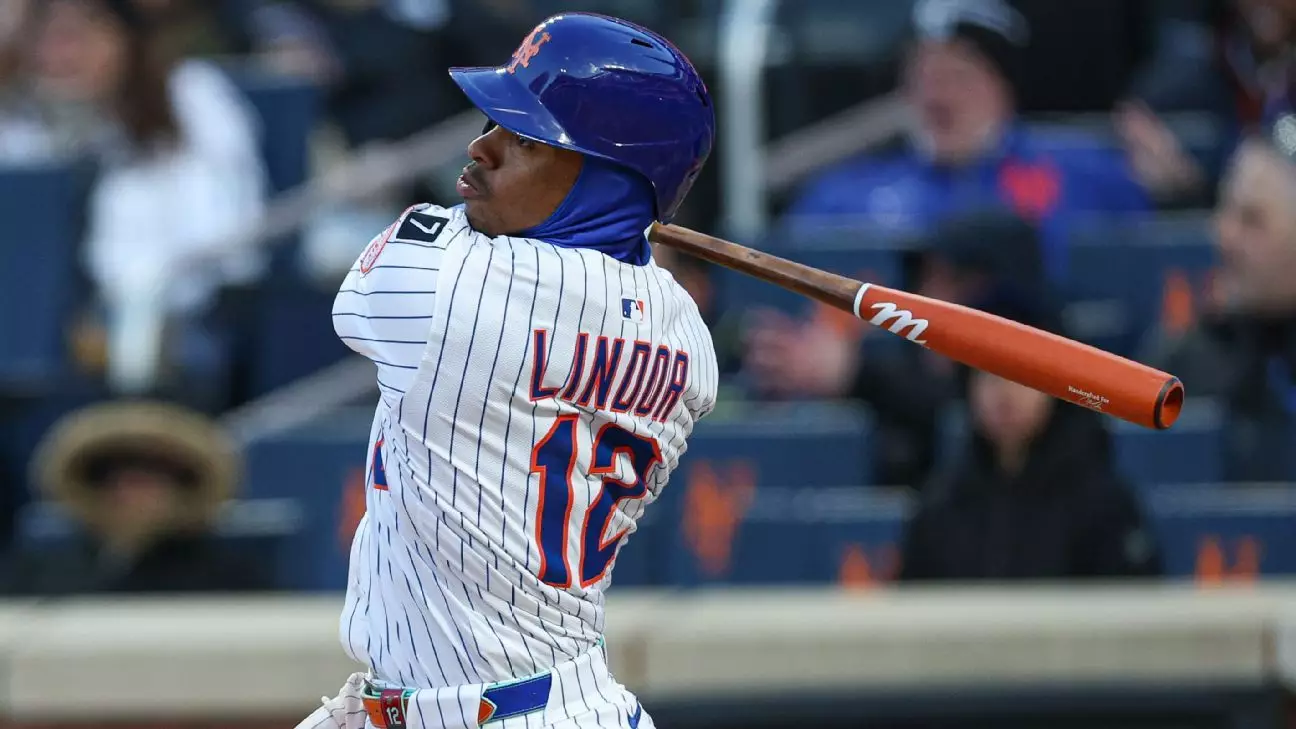In an era where physical prowess often overshadows mental fortitude in sports, Francisco Lindor, the New York Mets’ stalwart shortstop, exemplifies the indomitable spirit athletes must rally upon facing adversities. Recently, Lindor suffered a fracture to his right pinky toe after being hit by a pitch from Los Angeles Dodgers pitcher Tony Gonsolin. However, what stands out is not merely the injury itself but Lindor’s unwavering determination to remain on the field. Rather than succumbing to fear or pain, he embodies a mindset that could be referred to as grit—an essential trait for any athlete aiming for success in a cutthroat environment like Major League Baseball.
A Game of Pain
The incident occurred during the first inning of the game, where a slider from Gonsolin struck Lindor’s foot. Despite being visibly in pain, Lindor showed remarkable resilience, opting to continue playing through the discomfort for the entirety of the game. A decision to endure pain rather than bowing out raises questions about the psyche of professional athletes. For Lindor, the choice was emblematic of his dedication to his team—an ethos deeply ingrained in the fabric of competitive sports. He stated, “If I can tolerate the pain, yes I will play. If I can’t, then it’d be unfair to play with 25 guys on the roster.” This statement underscores the sentiment that athletes often weigh their personal struggles against the benefit and well-being of the collective team.
A Complicated Recovery Process
While Lindor has been deemed day-to-day with his injury, the reality is he is perhaps entering a multifaceted journey of recovery. Injuries are not simply physical setbacks; they carry psychological burdens that can weigh heavily on an athlete’s mind. Lindor’s acknowledgement of the pain intensifying when donning sneakers or cleats hints at a situation that could become increasingly problematic. Healing from a fracture usually demands patience, often extending over six weeks, and Lindor’s self-awareness about the potential “nagging” aspect of the injury emphasizes the fine line between ambition and caution. Professional athletes must often navigate the thin boundary between pushing their limits and risking further damage.
A Team Without Their Star
Perhaps one of the most telling aspects of Lindor’s situation is how a leading player’s absence alters team dynamics. Mets manager Carlos Mendoza has already begun preparing for this eventuality, indicating that young talent like Luisangel Acuna or Ronny Mauricio might step up to the plate. However, Lindor’s significance cannot be understated. He is not just any player; as last season’s National League MVP runner-up, his contributions are invaluable. His prowess both offensively—boasting a solid .279 batting average with 14 home runs—and defensively has placed him among the elite shortstops in today’s game. The conversation around replacing a player of his caliber emphasizes a broader truth in team sports: individual excellence often directly correlates to team performance.
The Mental Game
In discussing the impact of injuries on athletes, one can’t overlook the mental toll they take. Lindor’s musings reflect the dual struggle many players face—balancing the desire to compete and the necessity to prioritize their health. He conveys an understanding that “it’s part of the grind on your body as a professional athlete,” and this resignation to the realities of sport speaks volumes about the mental frameworks successful athletes build. While the physical aspect of recovery is critical, mental resilience becomes equally crucial. The fear of reinjury or prolonged absence looms large for someone in Lindor’s position—a weight that might not be apparent from the outside looking in.
Lindor’s Future Beyond the Injury
Ultimately, while Lindor navigates this immediate challenge, the conversation about his impact on the game and potential future contributions extends far beyond just this one moment. His leadership qualities and knack for performance in clutch scenarios make him a linchpin for the Mets going forward. Whether he is sidelined for the next few days or returns quickly, his mindset sets a tone that permeates the locker room. As athletes, they not only play for themselves but for the collective pride and ambitions of their teammates. Francisco Lindor’s commitment to not just endure, but thrive through discomfort, is a testament to what it truly means to play on the highest stage.


Leave a Reply